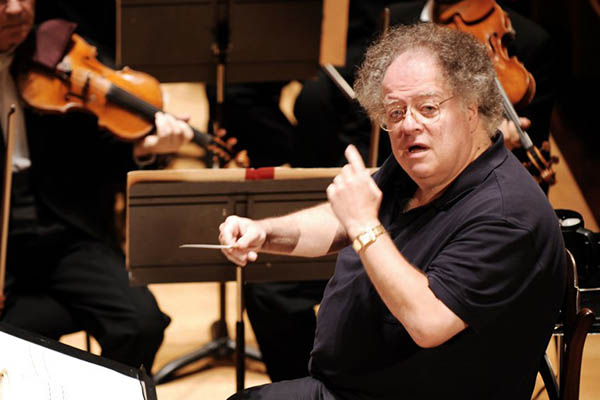
Miguel Medina—AFP
The 74-year-old James Levine allegedly abused several musicians when they were teenaged students
New York’s Metropolitan Opera said on Sunday it was suspending its famed longtime music director James Levine after multiple allegations of sexual misconduct.
The premier U.S. opera house said Levine would no longer appear at the Met this season and that it had hired a former U.S. prosecutor to investigate the accusations. “Based on these new reports, the Met has made the decision to act now, while we await the results of the investigation,” Peter Gelb, the general manager of the Met, said in a statement. “This is a tragedy for anyone whose life has been affected,” he said.
Gelb said that Robert J. Cleary, the former U.S. attorney for New Jersey best known for prosecuting the anti-technology mail-bomb assailant dubbed as the Unabomber in the 1990s, would lead the Met’s probe.
The suspension came after fresh allegations of misconduct against the 74-year-old Levine. The New York Post on Saturday first reported on a 2016 police report alleging that Levine abused a boy for years, starting in 1985 when the purported victim was 15.
Late Sunday, The New York Times published accounts by three more musicians who described similar experiences—the older Levine pressuring them into sex when they were teenage students.
Chris Brown, who went on to play principal bass at the St. Paul Chamber Orchestra, told the newspaper that Levine forced him to masturbate him during a summer at the Meadowbrook School of Music in Michigan. When Brown told Levine he did not want to repeat the sexual encounter, he said the conductor shunned him for the rest of the summer. Now 66, Brown said he has suffered emotional trauma for years.
The suspension marks a spectacular fall from grace for Levine, who had guided the Met’s orchestra for 40 years before retiring at the end of the 2015-16 season as he struggled with Parkinson’s disease. A legend in the opera world as the Met sought a wider public audience, Levine notably conducted some of the “Three Tenors” concerts that brought together Placido Domingo, Jose Carreras and Luciano Pavarotti.
Levine had stayed in a role of music director emeritus and led a youth artist program. He conducted what may turn out to be his final Met performance on Saturday—fittingly, Verdi’s Requiem.
The Met earlier said that Levine denied the charges in the Illinois police report when asked last year. The conductor has not been criminally charged and the alleged misconduct likely took place too long ago for prosecution.
Levine’s suspension comes amid a flurry of revelations about the sexual misdeeds of powerful men, sparked by allegations of widespread abuse by Hollywood mogul Harvey Weinstein.
Levine’s departure causes one immediate programming headache for the Met—finding a conductor for its new Tosca, one of the most popular works in the opera canon, which is due to premiere at a gala on New Year’s Eve.
The Met has been hoping for a triumphant return of Tosca—seen as a key moneymaker for an opera house that has long struggled to stabilize its finances—but the production has been marred by repeated changes.
Rising young conductor Andris Nelsons, a Latvian who leads the Boston Symphony Orchestra, in July pulled out and was replaced by Levine, who conducted Tosca in his Met debut in 1971.
Nelsons had been juggling a busy schedule and decided to exit after his wife, soprano Kristine Opolais, herself left the title role after recent mixed reviews.
There was also a fourth key departure—German tenor Jonas Kaufmann, one of the biggest stars in opera, was originally cast but said he wanted to spend more time with his family.
The Met has promised that its latest Tosca, directed by David McVicar, will restore the grandeur of its longtime production by Italian legend Franco Zeffirelli.
The Met in 2009 modernized Tosca with a new production by Swiss director Luc Bondy, who chose a more sparse staging. The reaction was unusually hostile, with booing on opening night.
